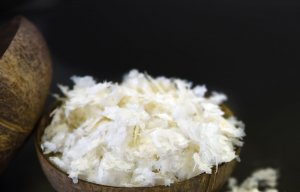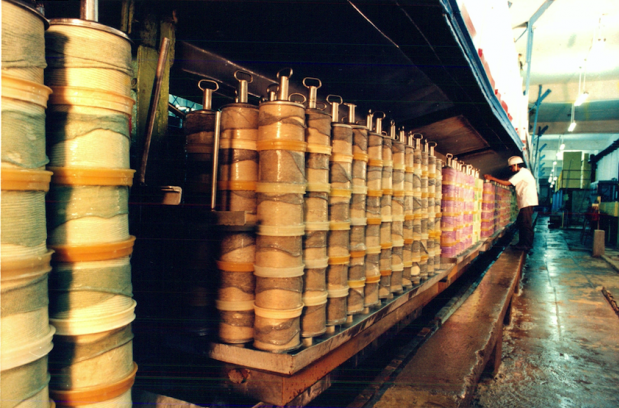
Birla spins 20% Nanollose fibres
Grasim Industries Limited, and Nanollose Limited have filed a joint patent application for a high tenacity lyocell fibre made from bacterial Cellulose.

12th January 2021
Innovation in Textiles
|
Mumbai, India
Birla Cellulose, part of the Aditya Birla Group and one of the world’s largest man-made cellulosic fibre producers, has announced that it has filed a joint patent application with innovative Australian company Nanollose for a high tenacity lyocell fibre made from bacterial cellulose.
The two companies, which signed a collaboration agreement in February 2020, will now focus on taking this success to the pilot production phase to produce initial commercial quantities of fibre to enable commercial agreements with fashion brands. The lyocell market is predicted to be worth US$1.5 billion by 2024, growing with a CAGR of around 8%.
The patent application, entitled High Tenacity Lyocell Fibres from Bacterial Cellulose and Method of Preparation Thereof, is said to represent a major advancement over Nanollose’s previous viscose versions of nullarbor and nufolium. Using the lyocell process, a team of fibre experts at Birla Cellulose, Pulp and Fibre Innovation Centre have produced nullarbor fibre that is finer than silk and significantly stronger than conventional lyocell that is traditionally produced from wood pulp.
Lyocell is a form of rayon, made using a closed loop process with low demand on chemical and water usage and low waste generation. This makes it very environment-friendly and brings with it an elevated demand from clothing brands. Lyocell is widely used in textile and nonwoven applications and has become popular due to a number of desirable strength and comfort characteristics. Furthermore, the combination of the Nanollose’s Tree-Free cellulose, along with Birla Cellulose’s closed-loop lyocell production process, could potentially make this Tree-Free lyocell one of the most eco-friendly and sustainable fibres available.
The joint patent application strengthens the intellectual property portfolio of both companies and provides protection for this innovative Tree-Free fibre technology. The nullarbor lyocell fibres are produced using feedstock from industrial and agricultural organic waste.
Commenting on the patent, the Chief Technology Officer of the Aditya Birla Group and Birla Cellulose, Dr. Aspi Patel, said: “This innovative development is another important step in our continuing journey to make our fibres more sustainable. This is an exciting development in the area of next generation alternative feedstock, and we are looking forward to scaling up this technology in collaboration with Nanollose.”
Commenting on the patent, Nanollose Executive Chairman, Wayne Best, said: “We are extremely pleased with the progress of our collaboration with Birla Cellulose which has already delivered this joint patent application. The nullarbor fibre produced by the team at Birla Cellulose has exceeded our expectations, and we now have a fibre that is not only more eco-friendly but has superior properties over conventional tree-based fibres. We are very much looking forward to commencing the pilot production and presenting textiles made from this remarkable fibre to the fashion industry.”
The collaboration agreement provides Nanollose with a world class and globally recognised industrial partner, with the ability to accelerate development, commercialisation and provide a manufacturing foundation for future textile and clothing brands that uptake Nanollose’s Tree-Free fibres.
Birla Cellulose, the Pulp and Fibre business unit of Aditya Birla Group (ABG), is a leading sustainability focused man-made cellulosic fibre producer. Its nature-based fibres come from renewable wood sourced from sustainably managed forest. Grasim Industries Limited, a flagship company of ABG, ranks amongst the top publicly listed companies in India and operates Indian facilities of Birla Cellulose.
Birla Cellulose operates 12 pulp and fibre sites globally that apply closed-loop processes and environmentally efficient technologies that recycle raw materials and conserve natural resources. It’s five global advanced research centres are equipped with state-of-the-art facilities and pilot plants. It’s new generation innovative products like Livaeco, Liva Reviva, Birla Excel (lyocell), Liva Antimicrobial and Birla Spunshades are said to be designed with superior sustainable credentials. With an aim to create bigger and broader impact, Birla Cellulose says it collaborates actively with its value chain partners and works closely with organizations like, Canopy Planet, Sustainable Apparel Coalition (SAC), Zero Discharge of Hazardous Chemicals (ZDHC), Changing Markets Foundation, Textile Exchange, WBSCD, Fashion for Good amongst others to continually learn and apply the best practices within its global operations and across its value chain.
Nanollose Limited is an innovative Australian company that uses an eco-friendly fermentation process to grow fibres that could become a sustainable alternative to conventional plant-derived cellulose fibres. The company’s process, which uses streams from the agriculture and food industries, has the ability to produce ‘plant-free’ cellulose. Cellulose is the hidden polymer building block most consumers know nothing about but forms a huge part of items used in their everyday life such as clothing, paper and hygiene products, Birla Cellulose concludes.

Business intelligence for the fibre, textiles and apparel industries: technologies, innovations, markets, investments, trade policy, sourcing, strategy...
Find out more